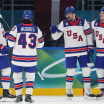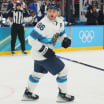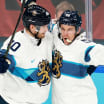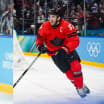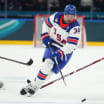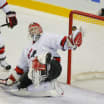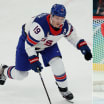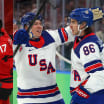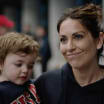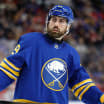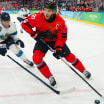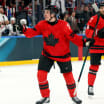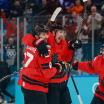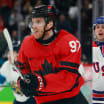William Douglas has been writing The Color of Hockey blog for the past eight years. Douglas joined NHL.com in March 2019 and writes about people of color in the game. Today, he profiles Alton White who was the first and only black player in the World Hockey Association.
Color of Hockey: White was quiet pioneer in WHA
Forward became second black player in any major North American pro league
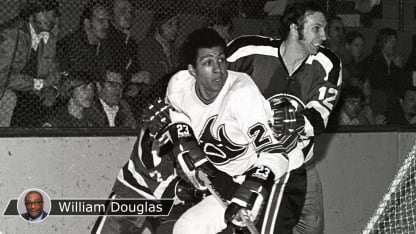
Alton White is often overlooked in hockey history. But he's not complaining.
"What can you do?" said White, who lives in British Columbia. "I'm way out here on the West Coast, and people kind of forget about us out here. If I were in Toronto, I probably would have gotten a lot more recognition because hockey players get a lot more publicity out there. But I had a good career, loved what I did and met a lot of great people."
White was the first and only black player in the World Hockey Association, a pro league that operated from 1972 to 1979, when the Edmonton Oilers, New England Whalers (now the Carolina Hurricanes), Quebec Nordiques (now the Colorado Avalanche) and Winnipeg Jets (now the Arizona Coyotes) were absorbed by the NHL.
White, now 74, became the second black player in a major North American professional hockey league when he signed with the New York Raiders in 1972.
He's the historical bridge between Willie O'Ree, who debuted with the Boston Bruins on Jan. 18, 1958, and Mike Marson, who became the NHL's second black player when he joined the Washington Capitals in 1974-75, the team's inaugural season.
White, who also played for the WHA's Los Angeles Sharks, Michigan Stags and Baltimore Blades, was the first black major league hockey player to score more than 20 goals in a season. He finished with 42 points (21 goals, 21 assists) with New York and Los Angeles in 1972-73. A black player didn't hit the 20-goal mark in the NHL until forward Tony McKegney had 52 points (23 goals, 29 assists) in 80 games with the Buffalo Sabres in 1979-80.
White was the first black player to have a hat trick in a major league professional game. He accomplished that feat when he scored three goals for the Sharks in an 8-5 win against the Chicago Cougars on Jan. 10, 1973.
He also notched one of the more unusual hat tricks in a game against the Minnesota Fighting Saints on March 1, 1973. White scored his first two goals in the normal way, shooting the puck past Minnesota goalie Jack McCartan, who excelled on the U.S. team that won the gold medal at the 1960 Squaw Valley Olympics. He was awarded the third goal after someone from the Minnesota bench threw a stick onto the ice while White was on a breakaway toward an empty net in the third period and the play was blown dead.
Scott Surgent, author of the "Complete Historical and Statistical Reference to the World Hockey Association, 1972-1979," and other WHA books, said White has never been given his proper due.
"The WHA still has this profile, if you will, and a lot of people who are knowledgeable about hockey really don't have a clue to what the WHA was all about," Surgent said. "As a result, they just don't remember the significant players.
"It was significant that Alton White was signed by a WHA team," Surgent said. "I think he deserves to be recognized as the first black player in a North American major league, a professional league if you will, in the 11-12 years since Willie O'Ree played. I think it's important that his name be known because he was a good player."
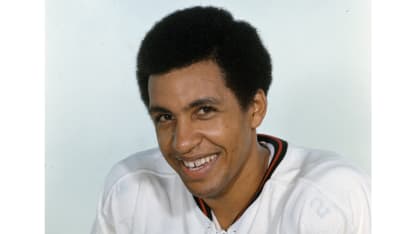
Marc Tardif remembers White well. The former Nordiques and Montreal Canadiens forward and White were WHA teammates on the Sharks in 1973-74.
"He was a very good hockey player," said Tardif, who had 401 points (194 goals, 207 assists) in 517 NHL games and 666 points (316 goals, 350 assists) in 446 WHA games with Los Angeles, Quebec, Michigan and Baltimore. "On the ice, he was really intense, and he was really good friends with everyone on the team."
Born in Nova Scotia and raised in Winnipeg, White signed with the WHA's Raiders in 1972 after he had 174 points (84 goals, 90 assists) in 218 games for Providence of the AHL and 268 points (113 goals, 155 assists) in 270 games for Fort Wayne and Columbus of the International Hockey League from 1965-66 to 1971-72.
He had hoped that his minor league accomplishments along with and the NHL's expansion in the 1960s and 1970s would create opportunities for him to play in the League, but nothing materialized.
"I thought I was good enough to play but I never did get the call," he said. "I worked hard, I tried to be aggressive. When I played I was like 155 pounds. I wasn't a crasher, banger. I could skate really well and could pass the puck very well."
White played in 13 games for New York before requesting a trade because of lack of playing time. He was sent to Los Angeles, where the 5-foot-9 forward became a fan favorite.
Being the WHA's lone black player didn't bother him, largely because was usually the only or one of a few black students at school or in youth hockey back home.
"I never really thought about it because it never dawned on me because of growing up in Winnipeg," he said. "We just took it for granted. Everybody just took us as ordinary kids."
He said he didn't experience racial discrimination until his rookie season in Fort Wayne when he and some white teammates were searching for lodging together and thought they had found the perfect place to rent.
"The (land) lady went around the corner so I couldn't hear and told them 'No, you can't because he's colored, you can't live here,'" White said. "That was my first experience being a black hockey player."
White said he rarely endured racially hostility on the ice during his playing days. Most of the problems came from spectators or occurred away from the rink.
"The worst city I played in was Dayton, Ohio," he said. "They were brutal. They were yelling, using the N-word, calling you all kinds of derogatory stuff. But never the players."
A leg injury, a growing family and the WHA's financial instability prompted White to retire from pro hockey at age 29 and join the family's construction business in British Columbia. His final stat line: 84 points (38 goals, 46 assists) in 145 WHA games.
Though he never played a minute in the NHL, White was an active member of the Vancouver Canucks Alumni Association and skated in charity games over the years.
"The alumni started way back with the Western Hockey League Canucks," he said. "We probably played 10-12 games a year all over the province. I'm not as active now because they have a lot more young guys coming in now."
These days, White goes to junior and youth hockey games and is heartened by what he sees on the ice and in the stands.
"Especially in Vancouver, you see lots of people from India, China, all over," he said. "You're seeing more and more minorities playing. The game is changing, and I like to see minorities participating."
